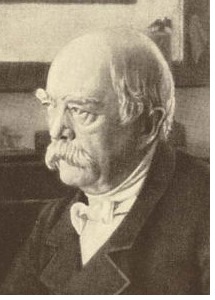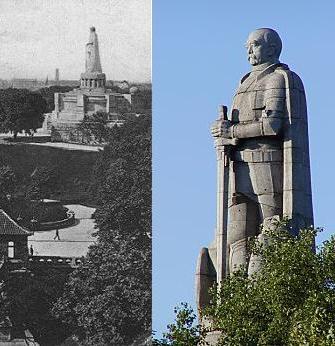Otto (Eduard Leopold Fürst (Prince) von Bismarck
Prime minister of Prussia and founder of the German empire, b. 1 April 1815 (Schönhausen, Prussia), d. 30 July 1898 (Friedrichsruh)
 Otto von Bismarck's father belonged to the land-owning gentry of Pomerania, a region of Prussia that had not yet been touched by industrial activity and where the estate owners continued to live off the labour of their peasants. The young Otto was thus exposed to the conservative views of a class that feared nothing more than change.
Otto von Bismarck's father belonged to the land-owning gentry of Pomerania, a region of Prussia that had not yet been touched by industrial activity and where the estate owners continued to live off the labour of their peasants. The young Otto was thus exposed to the conservative views of a class that feared nothing more than change.
But Otto's mother came from an established bourgeois family that counted academics and higher civil servants among its members. Deeply bored by life in the rural provinces, she took the opportunity to leave the estate when Otto turned seven. She enrolled him in a reputable school in Prussia's capital Berlin and moved to that city herself.
Pushed by his mother, Bismarck made it through high school and through a short period at university before entering the Prussian civil service, only to resign from it when his mother died in 1839. He then returned to his father's estate and settled into comfortable country life.
The revolution of 1848 strengthened Bismarck's resolve to defend traditional feudal society; but he developed a strategy that no other conservative could foresee: The autocratic state would survive through manipulation of all classes, using tactical concessions were appropriate and rewards for obedience.
When Bismarck was elected to the Prussian lower house in 1849 he had only one aim: maintain the established order. German unity was not in his sight - on the contrary; he declared that "We do not wish to see the kingdom of Prussia obliterated in the putrid brew of cosy south German sentimentality." The king of Prussia could only agree and appointed him in 1851 as the Prussian representative to the federal Diet (the parliament of the German states) in Frankfurt.
The eight years in Frankfurt showed Bismarck two things: the political superiority of Austria, and the rise of industrialism and commerce in south Germany, which made Prussia a second-rate power. Bismarck began to think about putting an end to the fragmentation, which Germany had been suffering since the Thirty Years' War, and to make Prussia a major power through its leadership role in a united Germany.
After brief periods as ambassador to Russia and to France Bismarck became prime minister and foreign minister in 1862. Against the will of the lower house but with strong support from the king he began to boost Prussia's military power. His aim was to weaken Austria and ensnare the German states through military alliances. In a first step he got Austria to join in a war against Denmark, which gave Schleswig to Prussia and Holstein to Austria. He then prepared Austria's decisive defeat by supporting Hungarian national unrest in the Austrian empire. When Prussia attacked the weakened Austria it was supported by several smaller north German states. The peace treaty left Austria virtually unscathed but provided the annexation of most allies by Prussia, which now eclipsed Austria in power.
The northern half of Germany was now united, but south German resistance against unification remained strong. Again Bismarck saw the solution in a suitable war. He managed to incite France to declare war in 1870 and stirred nationalist sentiment to such heights that the four southern states joined the German confederation in 1871 to support the war: The new German empire, soon to be known as the "Second Empire" (to mark it as the successor to the Holy Roman Empire), was born with Berlin as its capital.
The end of the mini-states, abolition of their borders and end to the many customs duties found the full support of industry and commerce, and the liberal bourgeoisie, who for that reason had been an ardent supporter of German unification, embraced Bismarck as their hero. But Bismarck did not create a German empire to please them; he created it to defend the old order. So he now turned to the internal enemy. Having witnessed the brief existence of the Commune of Paris he declared that socialists and anarchists "are this country's rats and should be exterminated."
Again he followed his strategy of tactical concessions and open suppression. The socialist party was banned in 1878 and remained banned until 1890. At the same time Bismarck introduced social legislation that formed the basis for Germany's social security system of today. Accident insurance, superannuation and public health insurance were all introduced before 1890.
These and other measures failed, however, to curb the rise of the forces that Bismarck regarded as the "enemies of the empire". In the elections of 1890 these forces (the Catholic Centre, the Social Democrats and the Progressives) gained the majority of seats. To prevent a conflict that could turn into civil war the king forced his prime minister to resign. Bismarck spent the last eight years of his life in bitter resentment of his fate. He also wrote his memoirs, which contributed to the Bismarck cult that dominated Germany for fifty years.
Growing trade from industrial development had made the unification of Germany an absolute necessity. Bismarck's intention had been to create a united Germany so that he could conserve the old order. In the end he created the conditions that allowed its collapse and the establishment of a capitalist republic.
Photo: GNU Free Documentation License (Wikipedia)

The Bismarck Memorial in Hamburg, Germany. It was built in 1906 and financed by public subscription. The 43.3m tall memorial was the winning entry of a design competition which received over 200 entries. Left: the memorial in 1908; right: the statue on top of the memorial today.
Photos: check the copyright status.
home
 Otto von Bismarck's father belonged to the land-owning gentry of Pomerania, a region of Prussia that had not yet been touched by industrial activity and where the estate owners continued to live off the labour of their peasants. The young Otto was thus exposed to the conservative views of a class that feared nothing more than change.
Otto von Bismarck's father belonged to the land-owning gentry of Pomerania, a region of Prussia that had not yet been touched by industrial activity and where the estate owners continued to live off the labour of their peasants. The young Otto was thus exposed to the conservative views of a class that feared nothing more than change.